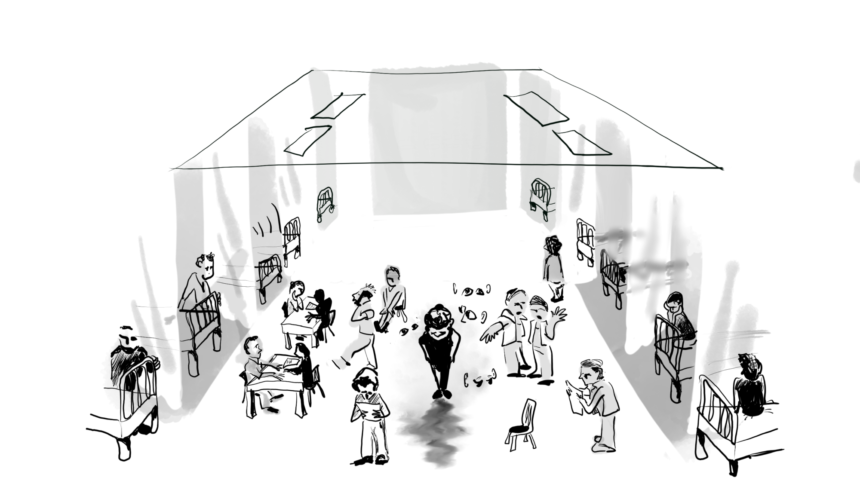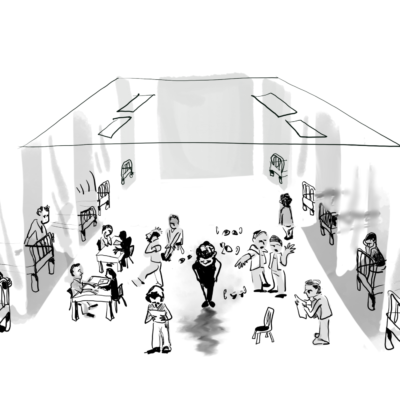Over several months in 2022, I had in-depth conversations with people placed at the asylum camp at Napier barracks – a bleak and dilapidated barracks that has been repurposed to accommodate asylum seekers. The findings are published in JRS UK’s new report Napier barracks: the inhumane reality. What I heard was truly disturbing. Napier was a site of re-trauma, where refugees are forced to relive memories of being brutalised in refugee camps on another continent as children, where the walls, security, and restrictions on daily activities make it feel like prison. Most research participants compared Napier to a prison. People talked about how they would have freedom when they got out and could structure their own lives: “When I leave this place I can decide when to eat, when to exercise, when to do work.” A loud, busy environment devoid of privacy makes respite impossible and enforces near universal sleep deprivation on residents. One young man described being in Napier as “asphyxiating”. They are cut off from the wider community and made to feel less human. These profoundly negative impacts arise directly from Napier’s institutional, prison-like, camp set-up.
Our research of course follows a lot of controversy about conditions at the site, including a June 2021 High Court ruling that it was inadequate to meet the minimum standards for asylum accommodation. The Home Office claims since then to have made many improvements at the site. What is striking, though, is how much continuity there is between the experiences JRS UK’s team heard about from men placed there shortly after Napier opened, and the experiences relayed in this report. Re-trauma, chronic sleep deprivation, and a deterioration in mental health were characteristic of life at the site before, and they are now. A key reason for this is that adjustments within that setting don’t stop it from being harmful.
For example, though there used to be a culture of intimidating Napier residents, many research participants now report good relationships with staff, saying how friendly and kind they were. But these weren’t enough to make Napier okay. One research participant explained: “[Napier is] like a prison. But really the people in Napier is good people…trying to help, but the problem is not from them. They are not ruling us. The government does.” He believed that the government had put him in a place like prison, and kindness on the part of site staff couldn’t alter the damaging effects of that.
Probably the most significant change to have occurred since the High Court ruling is the introduction of a 90-day time limit on placement at Napier. Previously, placement there was indefinite, as it is in detention, and, as in detention, this added another layer to the trauma of Napier. It was a dark tunnel with no end in sight. As mentioned in the report, the introduction of the time limit really did change that – it put light at the end of the tunnel. Again and again, people referred to the end that was in sight: “I’ve trained my mind to think ‘it’s just 65
days so just keeping going, keep existing, and to live one day at a time.” They were treading water, living in limbo, and the only thing that made this bearable was that it would end. Before Napier, people had been in asylum hotels, where the conditions were often awful and which shared with Napier many problematic features – asylum hotels are institutional and large scale and restrict agency to structure daily life. On leaving Napier, they’d be sent to dispersal accommodation – a shared house or flat in a community. They could live more normally. People who had lost everything, some of whom had survived torture and trafficking, experienced Napier as a trauma to be endured before they could, once again, start to live. And people would still plead for the time to be shorter: “Just take a few days from those 3 months. I’m not complaining, it’s fine, but 3 months is still 3 months.” It is not acceptable to knowingly subject people seeking safety to further suffering. The fact that such suffering is time limited offers no justification.
Napier is emblematic of a relatively new form of asylum accommodation for the UK – large-scale, institutional, in out-of-town, detention-like camps. The government just doubled-down on their plans to make sites like Napier prolific. Our research adds to the growing, and compelling, evidence of just how damaging this kind of institutional accommodation is, and how fundamental the problems with it are. What is needed is not minor tweaking, or modifications. It is a fundamentally different approach. We need communities not camps.



